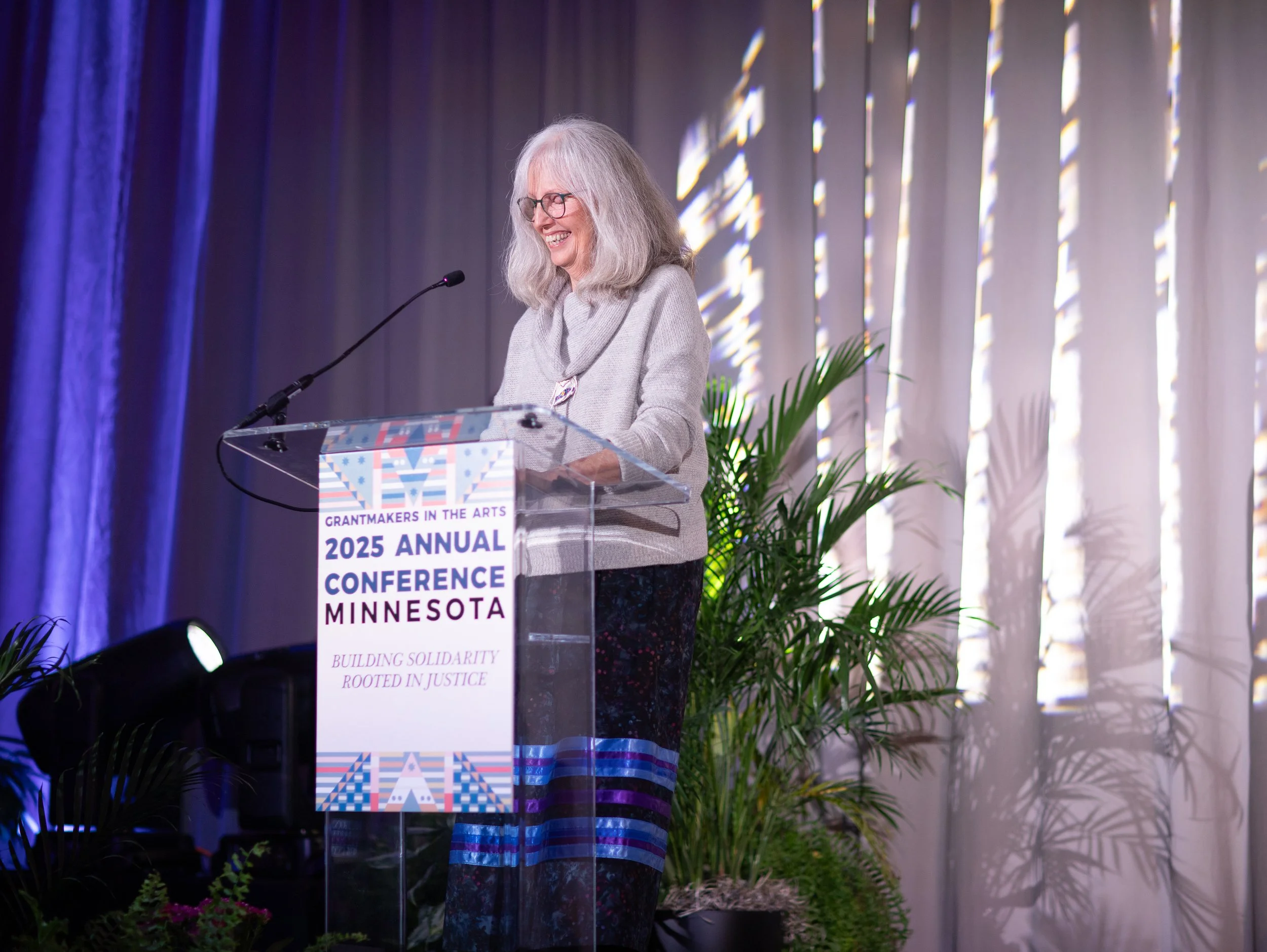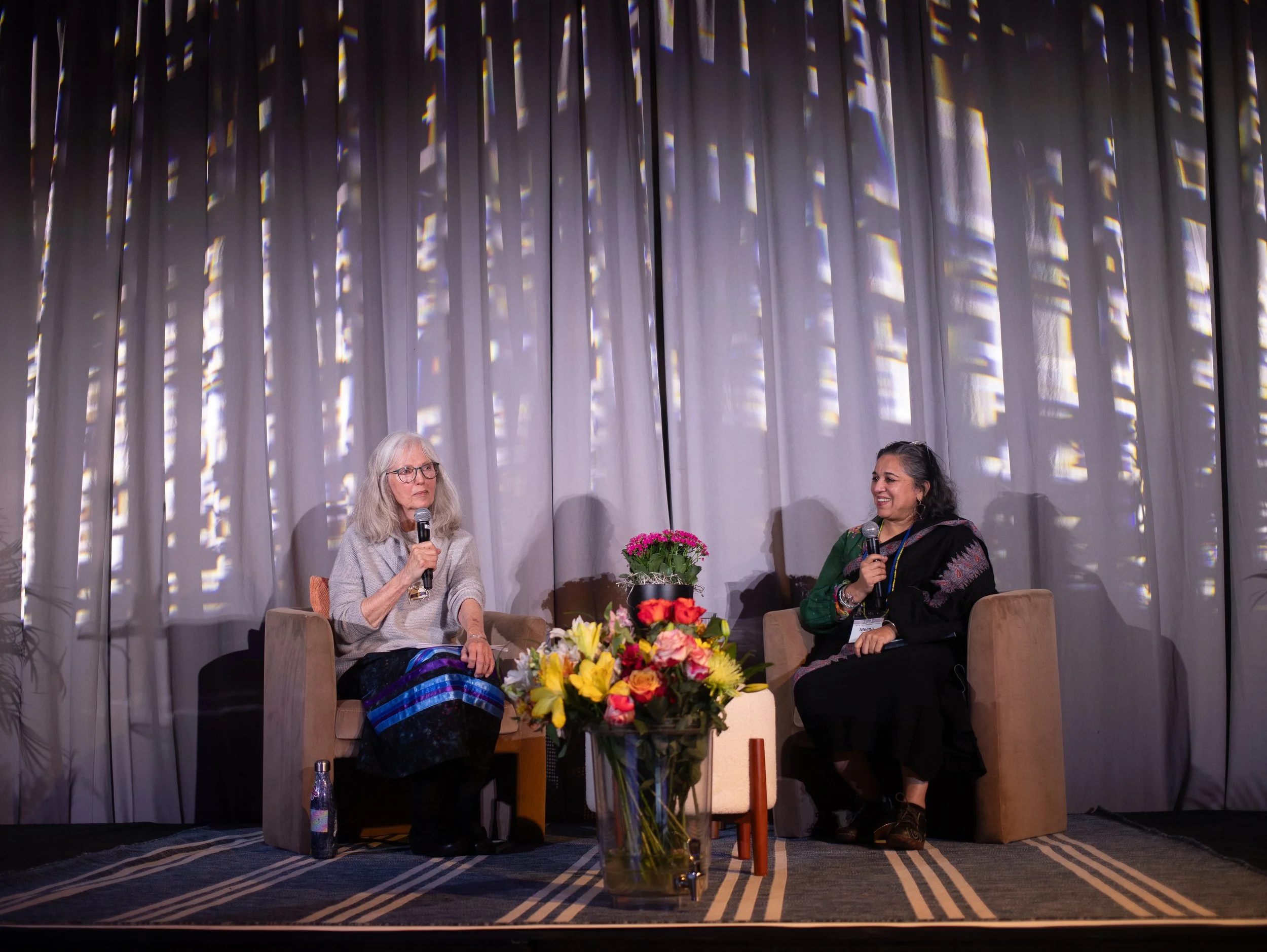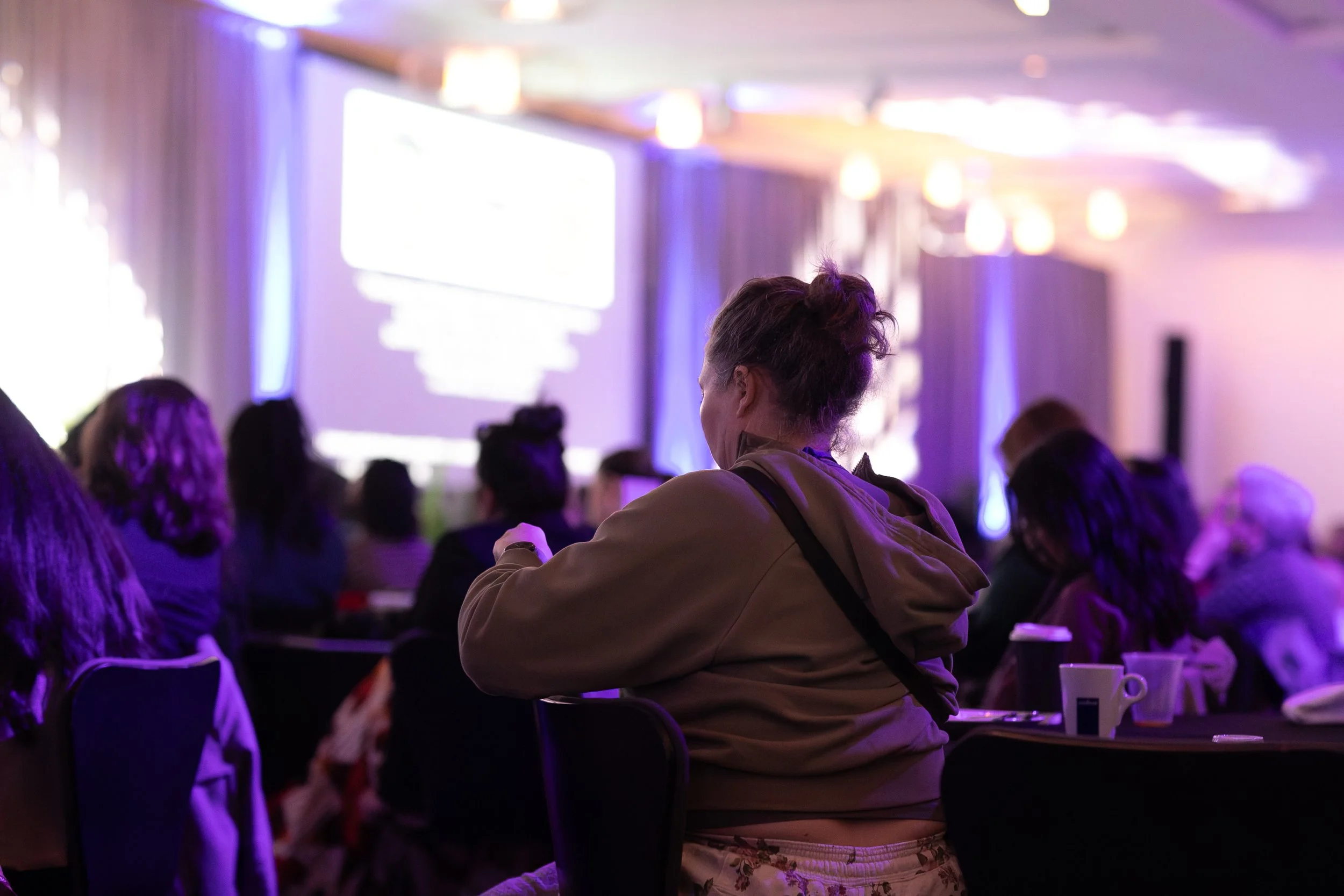The Seed of Change: Generosity, Land & Lineage
David Mura
Panel Description: Acclaimed Dakota author and advocate Diane Wilson offers a closing keynote on the power of reciprocity, relationship and the natural world to guide systems transformation. Drawing from her book The Seed Keeper and her broader work, Diane shares reflections on land, lineage and the lessons we need to move from scarcity to shared flourishing.
Tariana Navas-Nieves, the outgoing board chair, reported on the state of board and new board changes.
Meena Natarajan – from Pangea World Theater introduced Diane Wilson and conducted the interview after Wilson’s speech:
Diane Wilson:
Diane Wilson speaking her keynote address The Seed of Change.
For Diane, food sovereignty for Native people has been a central focus of her life, but at first she saw writing as a side gig: “I’m a gardener and I’m a writer, I take care of seeds and stories, stories define our relationship to the world we live in. We learn from stories where we come from, we learn from stories we don’t share, stories that repress, distort and erase. We live by stories, we live in them, we live stories planted in us, the stories we plant inside ourselves, and if we change the stories we live by quite possibly we change our lives.”
Diane said she is a descendant of oral storytellers; her work preserves the history and culture of her people and reflects their experience with assimilation. She spoke of interviewing Native elders in her work on her book, Spirit Car: Journey to a Dakota Past, and she asked them about how assimilation has impacted native cultural identity. She quoted David Larson: “When you know what was taken away, then you can reclaim.”
Dakota parents were devoted to the well-being of their children and regarded them as sacred, and for her book, Diane interviewed several elders about how they transformed trauma. The elders urged a return to traditional values, and said long ago the Dakota people were given all they needed to create a way of life that was beautiful in its regard for all other beings. The past 500 years is a short period, but we Dakota have been here for thousands of years and our spirituality has allowed us to survive.
Diane teaches ways of being a good neighbor and relative to everyone around us, a relationship based on reciprocity, love, and respect. Knowing you love the world changes you, activates you to defend and protect and celebrate the earth; this love of the earth creates a sacred bond where you recognize the earth as a unique entity and the earth loves you in return. In Indigenous cosmology, humans are related and interdependent with plants, animals, stones, water, clouds, and all of nature possesses rights in a natural democracy.
The Settler/Western colonizers sought dominion over nature; they believed in a hierarchy of life and a transcendent male god. This enabled a perception of the world in material terms, leading to objectification, and democracy was only the right of humans.
In traditional knowledge and practice, the native people observed the seasons of nature, the migration of white tailed deer and bison; they nurtured plants for medicine and food, and developed a seasonally based food system, founded on a deep respect and knowledge of the earth. This earth centered spirituality was maintained through reciprocity, and the cultural practice of receiving gifts from nature and land. The Native humans had to protect and nurture the land, and honor the original agreement between humans and the earth. Through all of this, stories, ceremonies and teachings that helped us release painful experiences.
“When we are silent, contemplative, we enter into communion with the earth our mother, restoring balance to the body, mind, spirit and emotions….nature was not wilderness, but hospitable, our relation.” Diane maintains that the lack of respect for growing and living things leads to a lack of respects for humans. The teachings of her people were maintained through oral stories, passed down to children, told and retold. Her work as a writer carries on this tradition.
Voices from Pejuhutaziz: Dakota Stories and Storytellers
Diane Wilson pictured with Meena Natarajan.
In this book Diane explored how women served as tribe’s traditional cultural keepers; today native writers are reclaiming our stories.
In the 1800’s the Europeans arrived, bringing very different relationship with the land, and there was a clash of food systems as well as culture, values, languages and spirituality. Land, plants and animals became commodities that could be purchased and sold. Placing Native people on reservations removed their sources of food from nature; instead, the Europeans brought food high in starch and fat. Food came in cans and sacks, and the ceremonies and songs of planting and harvesting could not be passed on. Indeed, in the late 1880’s Indian Schools forbid the teaching of Native language and spirituality and these practices continued to be banned until 1978. The damage can be seen today in rising health disparities, poverty, addiction and mental illness in Native populations.
Understanding how we transform a historical trauma that resulted from this history, said Diane, led to her second book, Beloved Child. This books centers on how we transform the historical trauma that resulted from the history of Native people and their encounter with the European Settlers, and recover from that trauma. The recovery of the people is tied to the recovery of food, since food itself is medicine, not only for the body, but for the soul, and for the spiritual connection to history, ancestors and the land, maintains Devon Mihesuah, Choctaw historian.
One of the central focuses of Diane’s work as a writer and activist is seed and food sovereignty: “Through my work I’ve seen how small changes can slowly add up to big shifts in the broader community….returning to indigenous foods and gardening is a way of remembering that our food is central to all our cultures. The food choices make shapes the world we live in….As we struggle to address time of climate crisis and political upheaval, how do we reclaim a relationship with the earth?”
Diane said that no one in her family knew the history of boarding schools even though members had been forced into these schools: “….while researching I heard of a collection of rare indigenous seeds, and I knew we needed to be with these seeds, I was fascinated by the stories these seeds were carrying. 8000 year old traditional tabacco, black turtle beans--these seeds carried stories of the seasons and our ancestors who grew them and the ancient wisdom of the mother clan herself.”
“Restoring our relationship with the earth is also a pathway to building relationships between communities…We can reclaim a relationship with the earth that honors and respects indigenous homelands….a caring relationship with the earth is the birthright of all human beings….I can tell the story of what happened to our people by telling the story of what happened to our food.”
So as a native gardener and writer, she moved into food sovereignty. The work was creative, relational, and community based. She spent time with all of the community. “Each day was a slow unlearning of what I had been taught in public schools growing up …When we garden with reverence our food becomes our medicine, we are healing ourselves, praying to the plants, remembering our ancestors. Seeds are our ancestors and our relatives, they taught us mindfulness, ….seeds reconnect us with our stories and ancestors, heal us.”
Diane often refers to a true story that has been silenced for several generations. This story involves how 1700 Dakota women, children and elders were forcibly removed from Minnesota after the 1862 war. The Dakota woman hid and saved these seeds and protected them: “Thanks to their courage and sacrifice, we still have Dakota corn to grow today….” This is a story of protecting what we love: “Because we cared for each other, the people and the seeds survived.”
Seeds are a connection to our past, the circle of time itself, and the endless cycle of creationour ancestors protected these seeds at all coast.
Today our seeds are facing a climate crisis and the extinction of these seeds, said Diane. We are facing a crisis of relationship, our spiritual practices have been discarded for profit. What actions can we take in face of global issues and their immensity?
Stories can be a wondrous of telling us who we are, but stories can be used to divide, repress and erase our true history. Native artists restore and retell our stories and create new stories, and this is an essential tool in addressing the marginalization and silence around Native people:
“Our biggest issue is our invisibility. 78% of Americans said they had no knowledge about native people…..If we can change the story, we can change the future…The arts are even more today for the stories that remind us who we are and who we choose to become as human beings….art has always been a sharp blade for truth telling….Through art we are witnesses to the plants and animals who are threatened with extinction or have already become extinct.”
Note: Bio of Diane Wilson (from her webpage)
Audience listening to the keynote address.
Diane Wilson (Dakota) is a writer, educator, and bog steward who has published five award-winning books as well as essays in numerous publications.
Wilson’s 2021 novel, The Seed Keeper, (Milkweed Editions) received the 2022 Minnesota Book Award for Fiction, was selected for the 2025-26 NEA Big Read, and is published in France. Her memoir, Spirit Car: Journey to a Dakota Past (Borealis Books) won a 2006 Minnesota Book Award and was selected for the 2012 One Minneapolis One Read program. Her 2011 nonfiction book, Beloved Child: A Dakota Way of Life (Borealis Books) was awarded the 2012 Barbara Sudler Award from History Colorado. Wilson's middle-grade biography: Ella Cara Deloria: Dakota Language Protector, was an Honor selection for the 2022 American Indian Youth Literature Award. She is a co-author of a picture book, Where We Come From, (Lerner Publishing), winner of the 2023 Carter G. Woodson award.
Her most recent essays—which explore seed advocacy, food sovereignty, social justice, and cultural recovery—have been featured in acclaimed anthologies, including: Kinship: Belonging in a World of Relations (2021); We Are Meant to Rise (2021); and A Good Time for the Truth (2016) as well as in notable environmental publications, including Orion: Nature and Culture and Emergence.
Wilson is enrolled on the Sicangu Oyate (Rosebud) reservation in South Dakota, and is a Mdewakanton descendent. She lives near the St. Croix River in Minnesota, where she cares for an Indigenous seed garden, native perennials for pollinators, and a Tamarack bog.



